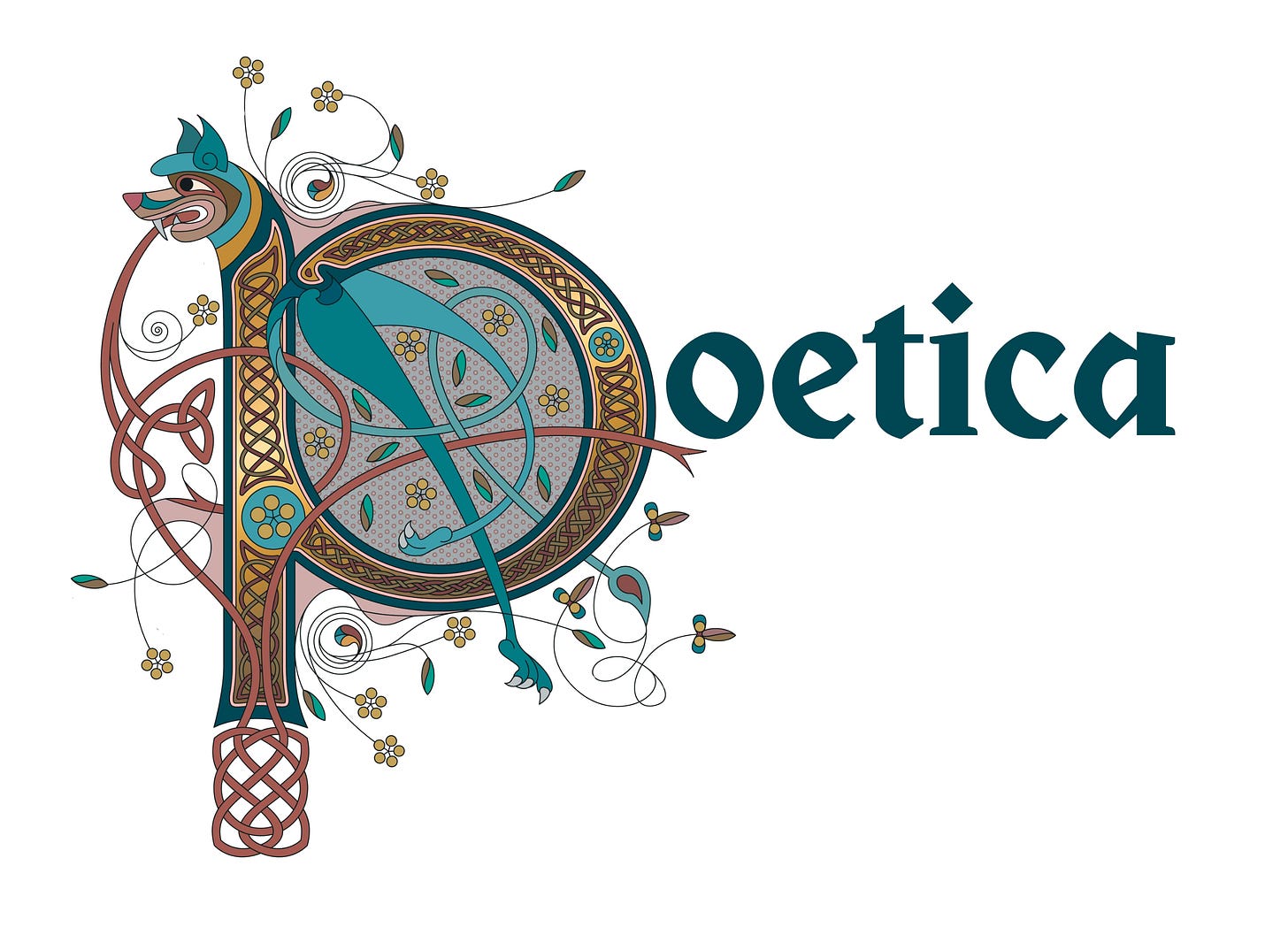Welcome to Poetica, the monthly poetry column of Shadowlands Dispatch! This month, we are pleased to feature a “Father, I know that all my life,” a hymn written by Anna Laetitia Waring, followed by an analysis and reflection from Lanie Anderson, Shadowlands Dispatch Editor-in-Chief.
Father, I know that all my life
By Anna Letitia Waring (April 19, 1823 - May 10, 1910)
Father, I know that all my life is portioned out for me,
And the changes that are sure to come I do not fear to see;
But I ask Thee for a present mind intent on pleasing Thee.
I ask Thee for a thoughtful love, through constant watching wise,
To meet the glad with joyful smiles, and to wipe the weeping eyes;
And a heart at leisure from itself, to soothe and sympathize.
I would not have the restless will that hurries to and fro,
Seeking for some great thing to do or secret thing to know;
I would be treated as a child, and guided where I go.
Wherever in the world I am, in whatso’er estate,
I have a fellowship with hearts to keep and cultivate;
And a work of lowly love to do for the Lord on whom I wait.
So I ask Thee for the daily strength, to none that ask denied,
And a mind to blend with outward life while keeping at Thy side;
Content to fill a little space, if Thou be glorified.
And if some things I do not ask in my cup of blessing be,
I would have my spirit filled the more with grateful love to Thee,
More careful, not to serve Thee much, but to please Thee perfectly.
There are briers besetting every path that call for patient care;
There is a cross in every lot, and an earnest need for prayer;
But a lowly heart that leans on Thee is happy anywhere.
In a service which Thy will appoints there are no bonds for me;
For my inmost heart is taught “the truth” that makes Thy children “free”
And a life of self-renouncing love is a life of liberty.
Analysis and Reflection
By Lanie Anderson
I’m a product of the nineties—and contemporary Christian music (CCM). I grew up during the period when many evangelical churches began having two services: one with more traditional forms of worship and another with CCM.
In college, I was excited to find a church of my own choosing, one that catered to my taste in CCM. I had grown up singing from a Baptist hymnal every Sunday, but I was ready to attend a church that matched my taste for the CCM I’d heard on the radio or burned CDs from my older, cooler friend in the youth group.
Today, I still love so much of what CCM has given us in American evangelicalism, but, fifteen years after my freshman year of college, my family and I have landed in a smaller Presbyterian church that sings from a hymnal every Sunday.
It’s one of the best parts of the week for me. As we begin to sing, I always look at the bottom left corner of the page to see who wrote the hymn and when. The titles span the centuries, and I always feel more connected to that “large cloud of witnesses” across history, particularly the poets.1 After all, hymns are simply poetic verse set to music.
Recently, we sang “Father, I know that all my life” by Anna Letitia Waring, published in 1850 in Hymns and Meditations. I had never heard it but was immediately struck by its beauty and the unwavering devotion to God described in its eight stanzas.
Although we sing “Father, I know that all my life” today in a congregational setting, the “hymn” took on a much broader meaning during the Victorian era:
The term “hymns” was used very loosely by Victorian writers, generally designating short, regular lyrical pieces on religious themes. It was thus used to describe original collections of private devotional verse—such as the popular Hymns and Meditations (1850) of Anna Letitia Waring—as well as congregational collections for collective worship in church.2
Because of the hymnal’s popularity for private devotion and congregational worship, it became “the only kind of anthology consciously to cater for the whole social range,”3 literate and illiterate: “It was also not unusual for hymns to provide the major literary stimulus outside the Bible. Hymns could thus provide a stepping stone to a wider field of literature.”4
These collections essentially took on a similar role to catechesis. In the Victorian era, families even reserved time for “Sunday verse” where they would read collections like Waring’s (a practice I wouldn’t mind if we revived!).
Waring was the daughter of Quakers Elijah and Deborah Waring; born in 1823, she was the third of seven children. Drawn to the sacramental nature of the Anglican Church, Waring was baptized into the Church of England in 1842.
We don’t know much about Waring, but her niece, Mary S. Talbot, wrote a memoir about her that was added to the 1911 edition of Hymns and Meditations. In it, she describes Waring as having a “deep inwardness” about her.5 In “Father, I know that all my life,” she asks for “a mind to blend with outward life while keeping at Thy side,” reflecting both this deep inwardness and intimacy with God, as well as a plea for more.
Waring wanted most not “some great thing to do or secret thing to know”; she was “Content to fill a little space, if Thou be glorified.” Without knowing anything about Waring, readers get the sense that she was a woman of deep compassion, asking God for a “thoughtful love… To meet the glad with joyful smiles, and to wipe the weeping eyes; / And a heart at leisure from itself, to soothe and sympathize.” And she was.
Waring was a philanthropist and spent much of her time working with the Discharged Prisoners' Aid Society, which helped former prisoners reintegrate back into society. Waring described her work this way: “It is like watching by a filthy gutter to pick out a jewel here and there, as the foul stream blows by.”6
Anyone who’s worked to help others reintegrate into society—whether from prison, homelessness, abuse, trafficking, and so forth—can sympathize with Waring’s comment. It is often a slow work, where the phrase “one step forward and two steps back” is an appropriate description for a person’s journey back into “normal” life. But Waring seems confident that this is the kind of “self-renouncing” love God had called her to:
Wherever in the world I am, in whatso’er estate,
I have a fellowship with hearts to keep and cultivate;
And a work of lowly love to do for the Lord on whom I wait.
Many themes run through this single hymn that can encourage and catechize us today. The teachings of Jesus beset every stanza, and the gospel shines bright in the final two:
There are briers besetting every path that call for patient care;
There is a cross in every lot, and an earnest need for prayer;
But a lowly heart that leans on Thee is happy anywhere.In a service which Thy will appoints there are no bonds for me;
For my inmost heart is taught “the truth” that makes Thy children “free”
And a life of self-renouncing love is a life of liberty.
Waring is confident in her Lord’s words: “You will have suffering in this world. Be courageous! I have conquered the world.”7 Christ himself suffered so she expected no less for her and us all, though the “briers besetting every path” and “cross in every lot” vary from believer to believer. However, Waring knows that “a life of liberty” and happiness is not found in some great place or fame, but in surrender to Christ. In her memoir about Waring, Talbot writes that Waring’s aim through hymns like “Father, I know that all my life” was to bolster this truth in the hearts and minds of Christian brothers and sisters:
But it is those who know for themselves that the life of the inward Spirit, the life “hid with Christ in God” is the most wonderful and mysterious, but also the most veritable of all human experiences, who will find in these hymns the voice of their own hearts…
Her natural gift was contemplative: her chief action was in thought… It was her love and desire for her fellow members in the body of Christ, which led her to offer to them the fruits of her own experience.8
Waring died in 1910 at 87 years old, and “Father, I know that all my life” was sung at her funeral. You can view a picture of her grave here, which is hardly legible and in need of repairs. We have very little information about her life and work, but that’s the way she wanted it.
In The Victorian Age in Literature, G.K. Chesterton writes, “[R]eal development is not leaving things behind, as on a road, but drawing life from them, as from a root.”9
As I’ve gotten older and returned to a church with more “traditional” forms of worship (a would-be surprise to my younger self), I’ve often described this decision in terms of “rootedness.” During a time of great deconstruction and skepticism, it has been good for me to remember that Christianity has a much longer, richer history than the nineties and early 2000s of my youth. Connecting with that tradition on Sunday mornings through hymns has anchored my faith amid turbulent cultural waters in countless ways.
When I discover and sing hymns like “Father, I know that all my life,” I’m reminded that I belong to a Church that spans back through centuries and across continents, and I don’t want to leave that behind. As Chesterton puts it, I draw spiritual encouragement and strength “as from a root” through brothers and sisters like Waring of the past.
And they do it through poetic verse.
—Lanie Anderson is Editor-in-Chief of Shadowlands Dispatch and a member of The Society for Women of Letters Leadership Council. She earned her MDiv with a specialization in Christian Apologetics from New Orleans Baptist Theological Seminary and also holds a BA in English from the University of Mississippi. Lanie has written for Christianity Today and The Center for Faith and Culture. She currently stays home with her two children and works remotely as a writer, editor, and digital marketer.
Hebrews 12:1 (CSB).
Rosemary Scott, “Poetry and Piety: The Role of Verse in Mid-Victorian Sunday Reading” (PhD diss., The Open University, 1992), 85, https://oro.open.ac.uk/54563/1/303397.pdf.
Ibid., 83.
Ibid., 84.
Mary S. Talbot, In Remembrance of Anna Letitia Waring in Hymns and Meditations (London, 1911), quoted in Rosemary Scott, “Poetry and Piety,” 197.
Richard Arnold, English Hymns of the Nineteenth Century: An Anthology (New York: Peter Lang, 2004), 127.
John 16:33 (CSB).
Talbot, In Remembrance of Anna Letitia Waring, quoted in Rosemary Scott, “Poetry and Piety,” 198.
G.K. Chesterton, The Victorian Age in Literature, in The G.K. Chesterton Collection [50 Books], 1883, Kindle.






Appreciation. This arrived from the Lord exactly at a moment of my feeling spiritually dull and frustrated. A gentle reminder of His loving Presence. A call to rest.